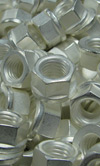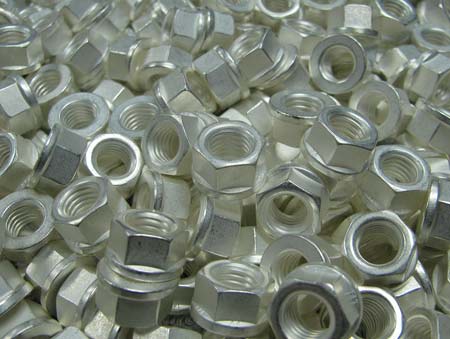Fastener coatings
 There are a huge number of materials from which fasteners can be made, but not all are suited to all applications. Materials from which commercially available threaded fasteners used in motorsport are made range from various polymers through aluminium and titanium to high-strength steels and superalloys. Some of these choices are not available to us owing to specific regulations that either proscribe the use of certain materials altogether, or limit the choice of materials from which fasteners are produced.
There are a huge number of materials from which fasteners can be made, but not all are suited to all applications. Materials from which commercially available threaded fasteners used in motorsport are made range from various polymers through aluminium and titanium to high-strength steels and superalloys. Some of these choices are not available to us owing to specific regulations that either proscribe the use of certain materials altogether, or limit the choice of materials from which fasteners are produced.
Beyond the choice of materials, there are also a number of fastener coatings that are used for motorsport applications. These can range from those that are simply to prevent or delay the onset of corrosion when parts are stored, through to those that seek to change the tribological behaviour of the material.
We are probably all familiar with seeing black steel fasteners, with cap head screws being popularly used in most branches of motorsport. The black surface treatment does not alter the part dimensionally, and retains oil on the surface of the fastener, preventing corrosion. Also used for corrosion prevention are a number of metallic plating processes, notably zinc, chromium and cadmium. There are real dangers in the electroplating of fasteners, as mentioned in the recent article in Race Engine Technology (issue 59). Hydrogen embrittlement can lead to sudden failure of fasteners, and care needs to be taken to avoid this.
Where its use is allowed, titanium is favoured for its low mass and low elastic modulus. The matter of mass is simple, while the reasons why low elastic modulus might be favoured have been covered in various RET-Monitor articles and in Race Engine Technology magazine (see issues 41 and 59). The use of titanium is outlawed for use in 'static' fastener applications in a Formula One engine, but is strangely OK for use in Formula One chassis construction. Perversely, there is no such ban on the use of titanium fasteners in many lower-budget race series.

Titanium is famous for its tendency to gall at low levels of applied surface stress, even under very low sliding velocities and most especially against other titanium components. It is common therefore to find titanium fasteners that have their threads coated. Coatings involving lubricious compounds such as molybdenum or tungsten disulphide are often used and may be found to be combined with other surface treatments such as anodising. Other coatings developed for titanium fasteners, for military use, involve the deposition of aluminium onto the threaded portions of fasteners, then applying a further chromate conversion process and lubricating compound. The paper by Zurko* describes such a process.
The coating of fasteners with silver is common for motorsport use, especially where they are used in high-temperature applications such as exhausts or turbochargers. Silver has a low shear strength, making it a good choice as a solid lubricant, and it also is very resistant to oxidation. High-strength silver-plated steel nuts are commercially available in both metric and imperial thread forms.
Reference
* Zurko, M.J., "Evaluation of Sermetal W Coatings for Fasteners", Naval Air Development Center Report NADC-75121-30, 1975
Fig. 1 - Silver plating of nuts is just one of a wide range of coatings used on motorsport fasteners
Written by Wayne Ward